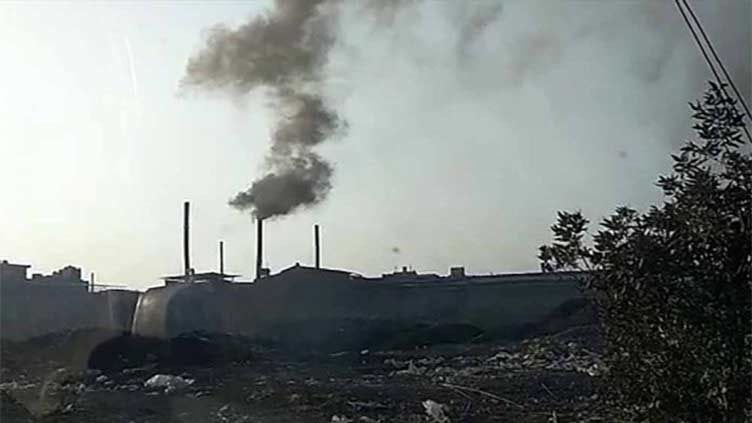Dug out roads, rising pollution playing havoc with Faisalabadites

Pakistan
Dug out roads, rising pollution playing havoc with Faisalabadites
FAISALABAD, (APP) - The dust clouds oozing out of dug-out roads with the passage of vehicles and mixing with industrial and vehicular emissions were posing serious health hazards to residents in different parts of Faisalabad city.
These suspended particulate matter not only produce smog, resulting in diminished visibility and road accidents but also expose citizens to multiple airborne diseases, especially those travelling by bikes, rickshaws, and other exposed vehicles.
Many roads dug out by departments like Water and Sanitation Agency (WASA), Sui Northern Gas Pipelines Limited (SNGPL), and Pakistan Telecommunication Company Limited (PTCL) to lay down pipelines were left unattended after their work is completed.
Consequently, the uncollected dust on the roads scatters all around with the movement of light and heavy traffic directly flowing to nearby houses and the lungs of the passersby.
The heaps of mud lying along roadsides and unfilled cavities and potholes hamper the smooth flow of traffic resulting in delays, traffic jams, and accidents as 25 to 30 main roads of the city are damaged and need immediate repair.
These roads include Faisalabad-Sargodha road, Chibban road, Khadija Memorial road, Jhumra road, Civil Lines road, Sheikhupura road, the road from Noorpur Stop to Noorpur Graveyard (Sabzi Mandi), Qaim Sain road, Hosiery Market road, main graveyard road from Nabh to Adam Chowk, Sheikhupura road, Malik Pur road, Gulistan Colony road, 66 feet Bazaar Nishatabad road, Chowk Jameel Abad-Jamia Salfia road, Ghazi Abad-Nallay Wala road, Ghona Road, Saifabad road, Fish Market road, Chak 204, Factory Area and Nazim Abad roads.
Residents in these areas have expressed serious concern about this situation describing it as a case of sheer negligence on the part of concerned agencies that leave these roads unrepaired after digging and laying down pipelines.
“The situation is pathetic. All the dust generated from the road in front of our house travels to our houses even bedrooms,” stated Omar Latif, a resident of New Civil Lines. “This road was dug out weeks back but not cleared of rubble that exposes us, especially the minors to multiple diseases.”
He demanded immediate action by concerned authorities to address this issue and secure people from diseases like cough, flu, bronchitis, and even asthma.
“This is quite worrisome that the third largest city of the country seems like the dirtiest due to dust and smoke clouds hovering over our heads,” said Javed Chaudhry, a resident of Gulistan Colony near Millat Chowk.
“The civic agencies do not turn up to clear the rubble after digging out streets and roads. Once their pipe laying work completes, they leave us at the mercy of dust and smoke,” he regretted.
The situation is also not different for the patients and school-going children who are equally exposed to this phenomenon.
“The students travelling by vans, rickshaws, motorbikes, and especially those on buses’ rooftops are the worst exposed to polluted air and accidents,” said Rana Muhammad Arif, Secretary General Anjuman Islah-e-Muashira. “They cannot help going schools whatever the condition of the road. Therefore, it is the shared responsibility of all concerned to construct or repair the worn-out roads and potholes on priority.”
Health experts are equally concerned about this situation with Dr. Anas Hameed warning of airborne diseases and injuries after accidents on damaged roads.
“Dust and air pollution due to depreciated roads create respiratory problems,” he said. “Moreover, potholes on roads could also cause compression on the backbone, disc herniation, spinal fracture, and severe lower back pain.”
He said roads with unusual cavities are more dangerous for aged people as they may suffer from cough, congestion, and bronchitis after inhaling polluted air. “Similarly, pregnant women have to suffer extra pain due to bumps and traffic jams when on their way to hospitals.”
The vehicle owners are also victims of this phenomenon complaining of damages to their vehicles after striking into potholes.
“In many cases, the situation is too pathetic. Traffic jams on shabby roads increase fuel consumption to 20 percent besides damaging tyres, engines, and body parts,” said Muhammad Asghar, spokesman of the truck drivers’ association. “We have to bear extra charges and financial loss due to this phenomenon.”
“All roads leading to the vegetable market were damaged and equally damaging for our vehicles and the products. It is too problematic for us,” said Ejaz Ahmad, a spokesman for Farmers’ Association Jhang Road.
It has been learned that in some areas, the people or departments deposit charges for the repair of dugout roads but concerned departments fail to repair it well in time.
“The Communication and Works Department (CWD) was not responsible for wear and tear of roads,” said a spokesman of local administration Muhammad Owais. “It is not our fault if any department leaves a dugout road unrepaired or if any road dilapidates due to overloading by goods vehicles.”
He said heavy trailers and trucks add extra load on four-wheelers just for their petty profit and damage the roads. “The CWD has not enough force to monitor and control the passage of heavy traffic with the extra load.”
He said the cases of damaged roads have been put up before the government and repair work would be started as soon as the funds are available.
In this scenario, the worst exposed community to health hazards is the Traffic Wardens who had to control unruly traffic, at the same time fight out the pollution.
“Traffic goes unruly when commuters frequently change lanes to avoid the pothole, becoming a real nuisance for us,” said a Traffic Warden Muhammad Shehzad. “Damaged roads add to pollution and we are the worst exposed community to airborne diseases.”
The citizens have demanded from the district administration and other concerned departments immediately take notice of this dilemma that exposes millions of Faisalabadites to serious health hazards.

